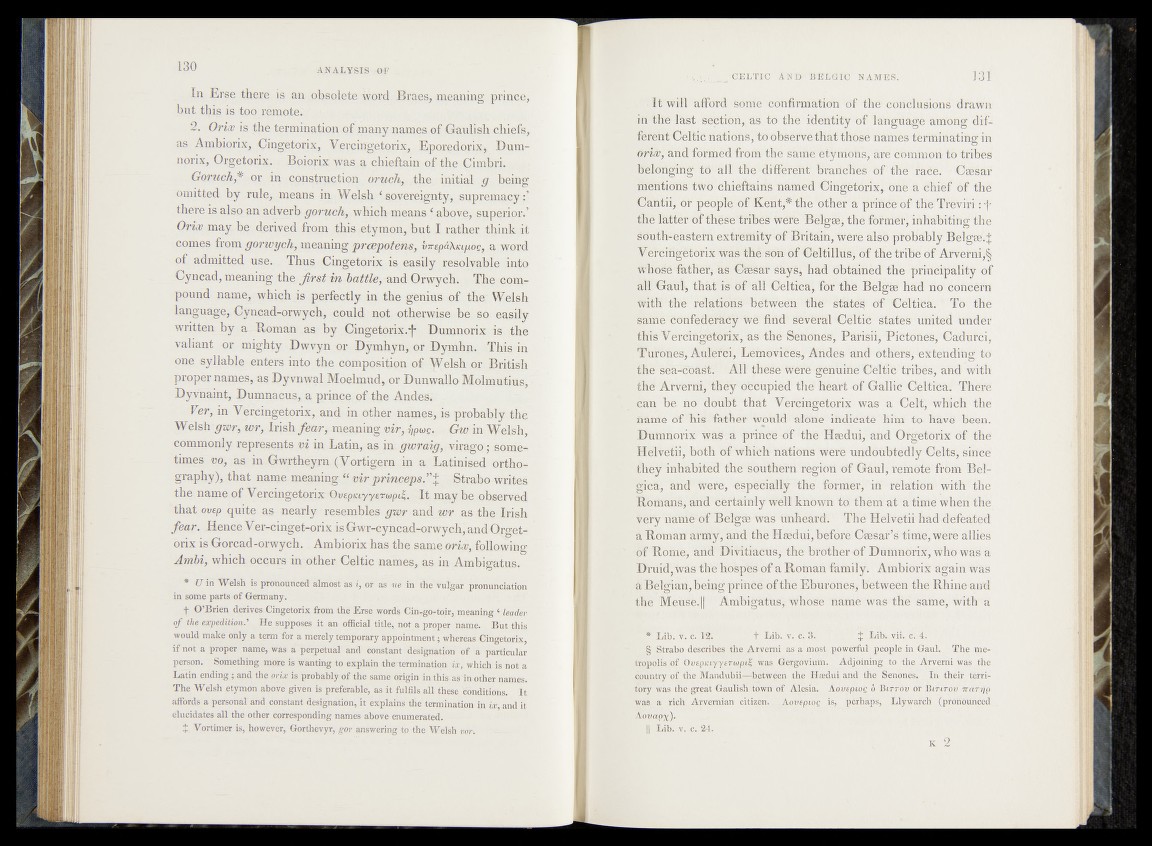
In Erse there is an obsolete, word. Br^gs, meaning prince,
but this is too remote, '
2. Orix is the termination of many nam^s.of-^G^]ish chiefs,
as Ambiorixj pmgptorix, Vei,pii|^.t§rix? E,par^dorix, Dum-
norix, Orgetprix. Bpiorix 5^ 8,9. chieftain of‘thgCimbri.
Gomch * or in c,obstruction oruch, the, initial g being
"Omitted by rule^jneans in Welsh ^sovereignty, suprenj^cy
there is also an adverb gpruch, whmbmeans ^above^. superior.’
Orix may. be derived from this .etymop, but I rather think it
comes from gorwych, meaning prcepofens, vvepa^Kipo^ a word
of admitted use. Thus Cingetarixi&, easily resolvable into
Cyncad, meaning the fir s t in battle, and Orwych. Th^pom-
ppur^ name> which isperfectly in thegfenius of the^W^sh
language,, Cyncad^orwych, could not otherwise be So^easity
written by a~ Roman ,as by Cingetorix ."I* Dumnorix is the
valiant or mighty Dwvyn pr Dymhyn, or Dymhn. This in
syllable enters into the composition o f Welshspr British
proper names, as Dy vnwal Moelmud, or Dunwallo Molmutius*
Byvnaint, Dumnacus, a prince of the Andes*
Very in Vhrcingetorix, anti in other name.sjis probably,the
Welsh gwr, wr, Irish /e a r, meaning mr, itpm. Gm in,W$lh,
commonly represents v i in Latin, as in, gwraig, virago^ some^
thribs vo, as im Gwrtheyra. (V ortigera, in a Latinised* ortho.,-
graphy), that name meaning j| v irp rin c ep s.,'% , Strabo writes
the name of Vercingetorix~ OvspKiyyerhtpii;. It? may be observed
that ovep quite as nearly resembles gwr and w r as the Irish
fear. Jlence Ver-cipget-afix isl^wr^eyncad-orwydHS^and Qteet-
orix is Gorcad-orwych. Ambiorix has the same "orix^following
Ambi, which occurs in other Celtic names, as inAmbigatus.
* U in Welsh is pronounced almost as i, or as u e in the vufgar pronunciation
in some parts of Germany.
t O’Brien derives Cingetorix from the Erse words Cin-go-toir, meaning $ leader,
o f th e e x p ed itio n .’’ He supposes it an official title, not a proper name. But this
would make only a term for a merely temporary appointment; whereas Cingetorix,
if not a proper name, was a perpetual and constant designation of a particular
person. Something more is wanting to explain the termination i x , which is not a
Latin ending; and the o r ix is probably of the same origin in this as in other names.
The Welsh etymon above given is preferable, as it fulfils all these conditions. I t
affords a personal and constant designation, it explains the termination in i x and it
elucidates all the other corresponding names above enumerated.
+. Vortimer is, however, Gorthevyr, g o r answering to the Welsh vor. '
CELTIC AND BELGIC NAMES. 131
It will afford some confirmation of the conclusions drawn
.ib^hw|loebsSCbtibri, as_tÖ thé identity b f Iringdàge rirnong dif-
fërèrit CëWc' rlàtionl\ ab bbl'ëwé that* thósé üàm'és terminating in
&Hw, andföFmedifföffi thë skdi^itymons, drd'èUmmbti to tribes
belonging td1 all the‘“dfffëfeiit b r a n c h ^ b f !ih e ‘ race. Cæsar
^Mëfationi'tWO'chiefraih^ named Gihgëterix, bn^e1 a iëftiëf of the
pdntîî; S-îW^t^lpbf Kent,* thé*óthera pMhé^of tKë’Trfeviri : f
the latter bf thês'e^l^ek' Ivérè ‘Éflfpf' tliè inhâbitihgthe
.l^tlftaÉliCTn1 extrëftiiiÿ !öf Britriin,'wêrè aléb p'robdblÿ Bel
W»hffi|Môrïx was the son öf ©felfïlld^%f 't|fè'ffib'é of Arverni,§
Wh'oéë' fathetv hs- l^hisar 3ay|ftia-d obtêÉinéd the principality of
ali Gàül, thàtfls'ferâ!F'13'ërti,'êa>Tbr the Belgèe' hètd no concern
with ' thè'"refetibw^betwee1ü "'thé sth-të'ë ôf VCë’lfleaf To the
KmE%brifeÜëi™^^we! find stevë'fhl Céltic stated united under
ÉMê'Tërd'ngëfôŸix, ’a^thg^Sbrrohe^,' Parish, PlétcMë^, Cadurci,
Turô®è^yAûlêfbi, Leinovfe^^Arides and éthers, extending' té
the^ëa^cbÉsiP^All fh^fwere^ggBumb^eltib tribes, and with
thé Afvefrii, fchëyT)hctrpied tlfe’Hëâr't of Gallic ♦©eftîba; There
p àn u$. nof doubt that Vercingétorix ■ Was a Celt', which the
îiâm'e bf hi'âÿfatbér wôttd alofte- îndiëâtè him- tö havë been.
Dütifnbrix- was a priricb-bf thé Hsedui, arid Ofgëförix of thj§
H â ’Vëf'i^feôt'h ofWhieh nations wëtb undoubtedly‘Celts, since:
thëÿ inhabited the southern regidti of Gaul, remotri'frbrii Bel-
'ipca'i arid *Wvere, ‘’^Specially the’ forriicrj ’ in relation with the
Romans, and bfertamly Weld known to, them'at a tiriîe whbri the
very name of Belgæ was unheard. The Helvetii had dëfêafèd
â Roman âfrify, and the Ilaödui, beforëtC^èar’#time, Were alliés
óf Rome, and Dititfacùs, the brother of Buinnbrix, who was a
Rofnari family. Ambiöfi^agairi was
à Belgian, being prince of the Eburones,- between the Rhineand
the Meuse.[| Ambigatus, whose name was the same, with a
* Lib. v. c. 12. t Lib. v. c. 3. $ Lib. vii. c. 4.
§ Strabo describes the Arverni as a most powerful people in Gaul. The metropolis
of Q vepicùyysTwpi£ was Gergovium. Adjoining to the Arverni was the
country of the Mandubii—between the Hædui and the Senones. In their territory
was the great Gaulish town of Alesia. Aovep.ioç à B i r r o v or Btnrou Trarrjp
was a rich Arvernian citizen. A o v e p io ç is, perhaps, Llywarch (pronounced
Ao iia p x ) .
,|j Lib. v. c. 24. ,
I 1